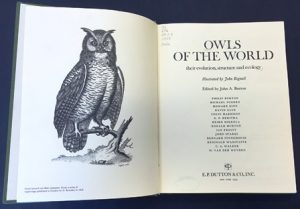In the early eighteenth century, English naturalist Mark Catesby set foot in a New World. After spending the better part of ten years, spread across two separate trips, exploring and more »
Category: Natural and Physical Sciences
Pamphlets, brochures, and other publications of thin width, are often bound with metal staples. The passage of time and environmental conditions, such as high humidity, may sometimes cause staples to more »

The Smithsonian Libraries salutes Dr. Nancy Knowlton, the Sant Chair in Marine Science at the National Museum of Natural History and senior scientist emerita at the Smithsonian Tropical Research Institute, who has received the 2016 Secretary’s Distinguished Scholar Award. The award celebrates excellence in all branches of Smithsonian scholarship by honoring the sustained achievement of one outstanding Smithsonian scholar each year.
This is the second post in a two-part series. Catch up on the first part here. Allegra Tennis interned with the Field Book Project and Metadata Services over the summer to investigate Smithsonian research related to countries with populations of under a million.
I came to the field of librarianship from a scientific background. The processes, details, and discoveries to be made have always held a magical quality for me. As I grew up and talked with others, I began to notice that not everyone views science in this way. Many people seem to be interested in science, whether in the idea of it, the usefulness of it, or they raw beauty of it. Yet too often people are intimidated by science, either by the research or by the researchers themselves.
Older hardcover books within the Smithsonian Libraries’ circulating collections often contain unique information which serve staff and patrons over the course of many years. With age and use, these items sometimes begin to break along the hinges. The book cloth becomes frayed, torn, or cracked and the spine piece may separate completely from the boards. This damage necessitates a repair which will conserve and recreate the original binding structure as much as possible.
This is the first post in a two-part series.
Lawrence N. Huber devoted several pages of his journal lamenting the fact that the Navy vessel he was aboard had run out of Wheat Chex. This comes from a young man who was out in the middle of the Pacific Ocean, banding thousands of often rather uncooperative birds, making observations of any type of fauna he came across in the Pacific Islands, and swimming in the ocean with open abrasions with the stated intention of attracting sharks. All these things to write about (which he also does), but his main complaints revolve around food, the quality of it, the quantity of it, and the absence of it, as in the case of his beloved Wheat Chex.
The post was written by Daniel Euphrat, Digital Imaging Technician.
The 1684 book Recreatio mentis et oculi by Filippo Buonanni is mainly a scientific text about mollusks. However, in addition to many informative illustrations of shells, there are a few more fanciful (and slightly terrifying) illustrations of Giuseppe Arcimboldo-style faces made out shells:

